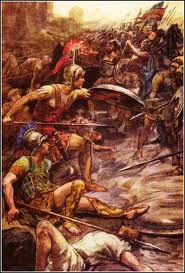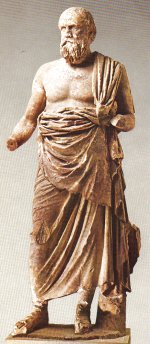Click here for direct link to audio podcast Episode #56. 
Click here for previous audio episodes.
Imagine the enemy is at the city gates and the residents of a Greek city sow corn in the streets to stay alive during the siege. And imagine the Roman ascendancy finding a broken Sparta (compliments of Philopoemen), only to turn it into a sort of theme-park complete with the trappings and discipline of better days.
Learn the details of Philopoemen’s leadership from Plutarch’s Lives for Boys & Girls, retold by W.H. Weston, and illustrated by W. Rainey, published in London & Edinburgh in the early 1900′s.
Sorry to have been so out-of-touch, but that is the life of a junior high schoolteacher! Those of you who are following my work will be excited to know that I am on my way to London to research a children’s book I am working on set in Roman Britain. I hope to return with plenty of cool stories to share with you about my discoveries. See you soon!







